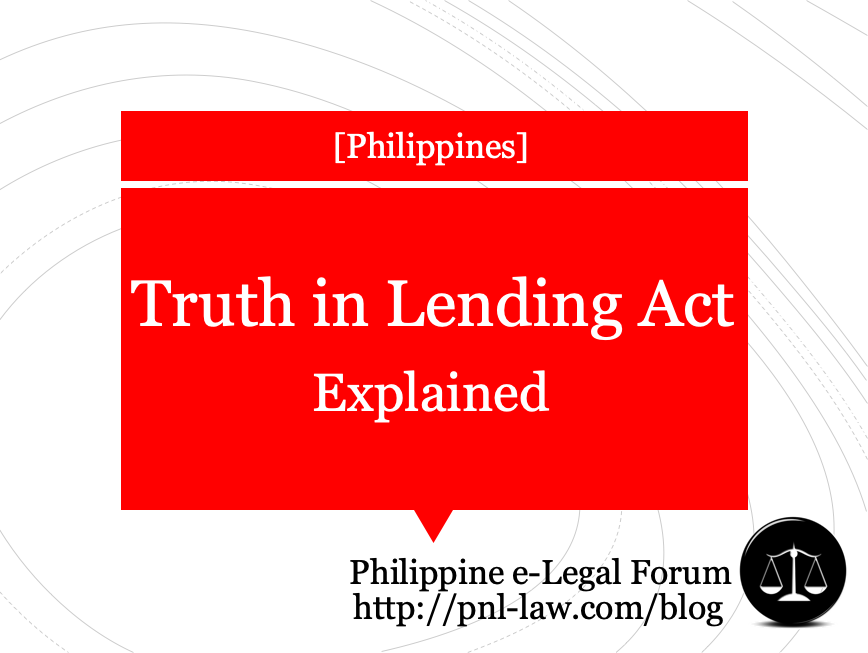


Republic Act No. 3765, also known as the “Truth in Lending Act”, is a law requiring the disclosure of finance charges in connection with the extension of credit. This is a summary of the Truth in Lending Act.

What is the policy behind the Truth in Lending Act?
The declared policy behind the law is to protect the people from lack of awareness of the true cost of credit by assuring full disclosure of such cost, with a view of preventing the uninformed use of credit to the detriment of the national economy.
Who are covered under the Truth in Lending Act?
The law covers any creditor, which is defined as any person engaged in the business of extending credit (including any person who as a regular business practice make loans or sells or rents property or services on a time, credit, or installment basis, either as principal or as agent) who requires as an incident to the extension of credit, the payment of a finance charge.
In that definition, what is meant by “credit”?
It means any loan, mortgage, deed of trust, advance, or discount; any conditional sales contract; any contract to sell, or sale or contract of sale of property or services, either for present or future delivery, under which part or all of the price is payable subsequent to the making of such sale or contract; any rental-purchase contract; any contract or arrangement for the hire, bailment, or leasing of property; any option, demand, lien, pledge, or other claim against, or for the delivery of, property or money; any purchase, or other acquisition of, or any credit upon the security of, any obligation of claim arising out of any of the foregoing; and any transaction or series of transactions having a similar purpose or effect.
In the same definition, what is meant by a “finance charge”?
A finance charge includes interest, fees, service charges, discounts, and such other charges incident to the extension of credit as may be prescribed by the Monetary Board of the Bangko Sentral ng Pilipinas through regulations.
What are the information required to be furnished to the debtor or borrower?
The creditor or lender is required to inform the debtor or borrower of the following facts:
When and how should these information be furnished to the debtor or borrower?
The information enumerated above must be disclosed to the debtor or borrower prior to the consummation of the transaction. The information must be clearly stated in writing.
What is the effect on the obligation in case of violations to the Truth in Lending Act?
The contract or transaction remains valid or enforceable, subject to the penalties discussed below.
What are the penalties in case of violation?
1. Any creditor who violates the law is liable in the amount of P100 or in an amount equal to twice the finance charged required by such creditor in connection with such
transaction, whichever is the greater, except that such liability shall not exceed P2,000 on any credit transaction. The action must be brought within one year from the date of the occurrence of the violation.
2. The creditor is also liable for reasonable attorney’s fees and court costs as determined by the court.
3. Any person who willfully violates any provision of this law or any regulation issued thereunder shall be fined by not less than P1,00 or more than P5,000 or imprisonment of not less than 6 months, nor more than one year or both.
However, no punishment or penalty under this law shall apply to the Philippine Government or any agency or any political subdivision thereof.

Atty. Fred Pamaos is a member of P&L Law (click on photo/name for profile). No legal advice is given in this forum. For other questions, use the "Contact Us" link.
